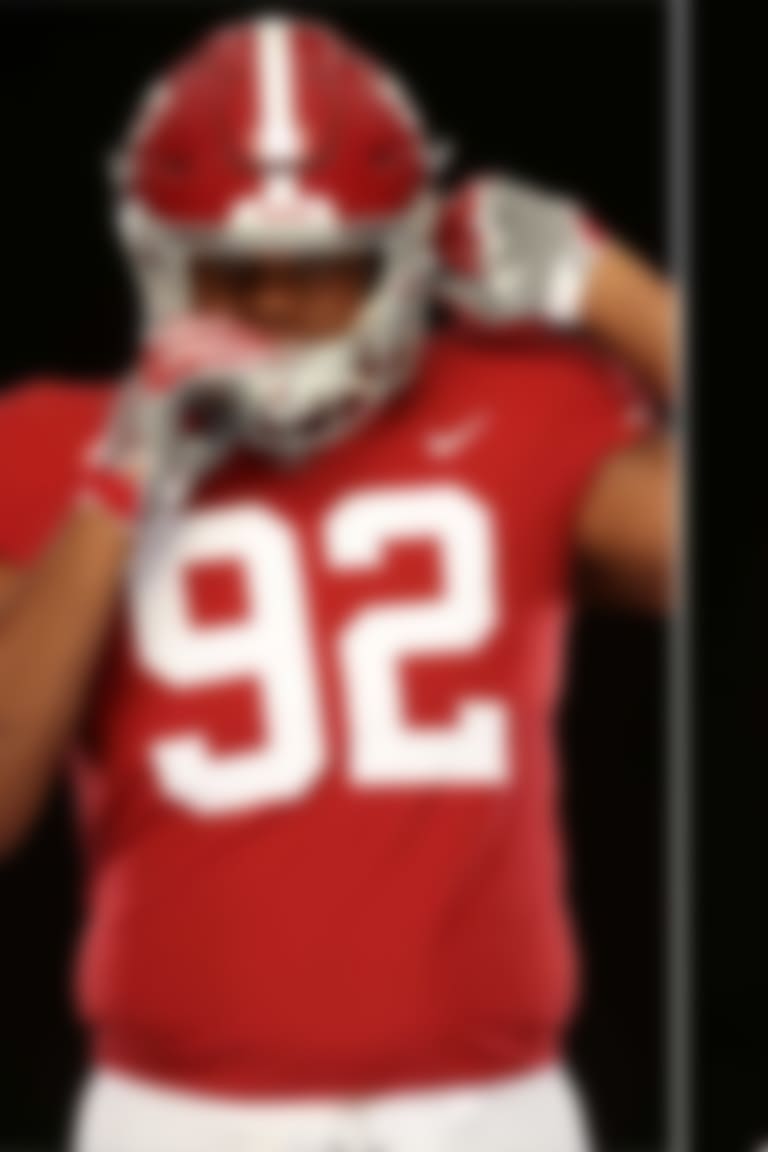Devastated by his mother's death at age 12, Alabama's Quinnen Williams channeled his grief into greatness en route to becoming the most destructive defensive lineman in college football
By Chase Goodbread | Published Dec. 24, 2018
BIRMINGHAM, Ala. -- Yvarta Henderson isn't sure if there's anything left to wait on. Eight years have passed. Her four grandchildren -- among them, Quinnen Williams, the former shooting star on the Alabama Crimson Tide defense -- are all exactly where their mother would have wanted them at this point. The older three are either in college or exiting it, and youngest is college-bound. By all outward signs, the kids are doing well.
It's the inward signs that are more difficult to read.
In the summer of 2010, Quinnen and his three siblings endured the anguish of watching their mother succumb to a cancer battle they thought she'd valiantly won for good five years earlier. Over the course of five weeks at Princeton Baptist Medical Center in Birmingham, the family went from having every confidence that Marquischa Henderson Williams would eventually walk out a survivor, to slowly absorbing the realization that, this time, she would not. The breast cancer she'd beaten before had returned and spread to her liver. She died at 38 years old.
It remains an emotional blind spot for the four children she left behind, particularly Quinnen, who lost more than just a mother at the tender age of 12.
"My mom was my best friend. Everything was gone," he said. "I had always been a smiling, outgoing kid, but when she passed, I shut down. I went into a dark mode."
On special days -- Marquischa's birthday, or Mother's Day, or on Aug. 10, the anniversary of her death -- the family openly celebrates her life and impact. But that impact is too great for the passage of time, even at eight years, to heal the wound. The grief process has stalled, and even to this day, Quinnen rarely speaks of those five weeks in the hospital.
"He just doesn't go there," said his father, Quincy Williams Sr.
So Yvarta isn't necessarily waiting on some breakthrough outpouring, some kind of emotional reckoning, to deliver her grandson some closure.
If it comes, it comes.
Meanwhile, there is no arguing with the upshot when it does. Quinnen emerged from relative obscurity to win the Outland Trophy as a redshirt sophomore last year, in his first year as a starter, and entered the 2019 NFL Draft with a consensus of draft analysts projecting him as one of the top prizes.
The memory of his mother has powered an explosive career rise for the former Crimson Tide wrecking ball of a nose guard, one that has made near-instant believers of NFL scouts in a player who was largely anonymous to them entering the 2018 season.
"You just don't see guys come from as far off the radar as he was, in one year, to being the guy everyone is talking about," said a regional scout for an NFC team.
Marquischa, a highly-devoted elementary school teacher, was to have begun her 16th year in the classroom in the weeks following her death. Teaching was in her blood -- her side of the family has amassed more than 100 years of collective experience in the classroom -- and she treated the profession more like a calling than a job. It's said in the family that Quinnen, of the four children, is most like his mom. But there's a stark difference he can't deny: His is not the heart of a teacher.
"They don't make a lot of money. You've got to love it," Williams said. "The educators around me, they would do it for free. That's something you've got to be born with, something you've got to have inside you. I ain't got that inside me."
Marquischa studied early childhood education at UAB and taught first grade and kindergarten at Brown Elementary in Birmingham, just three miles from where Yvarta did the same at Price Elementary. Marquischa became a teacher for largely the same reason as her mother: She didn't want her kids in day care, and her husband, Quincy, was able to care for them during the day because he worked as a night shift manager -- usually until 1 a.m. -- for Associated Grocers of the South. When the school day ended and Quincy had to go to work, he would hand the kids off to Marquischa.
They all attended Price -- the oldest, Quincy Jr., was one of his grandmother's first-grade students -- and out of respect, they called Yvarta "Mrs. Henderson" in school. Quinnen, to this day, still refers to his grandmother that way.
Like her mother, Marquischa balanced work and home any way she could, often showing up at her sons' football practices to watch, along with a stack of papers to grade at the same time. And when it came to her own children's grades, she did not play.
"We talked a lot, but it was never about football," said Corey Dorsey, who coached Quinnen with the A.G. Gaston Boys and Girls Club Jaguars. "She didn't mind her kids playing sports, but if something wasn't right with their behavior or schoolwork, she didn't care anything about football. Some parents just want to hear that the grade will come up next time around. That wasn't her."
Over the course of an hour last November, discussing his late wife and their children, Quincy Williams laughed out loud just once. It came while recalling Marquischa's reaction when subpar report cards came home. If it included two C's, she would tear it up and let the pieces fall to the child's feet.
She wasn't afraid to leverage sports participation against academics. Once, she got Quincy Jr.'s report card, laden with too many C's, while he was at practice.
She didn't wait to confront him.
"She comes right on the field, in the middle of practice, walks right by the coach and pulls me off," Quincy Jr. said. "No grades, no football."
It wasn't just apparent to family that Quinnen would deal with his mother's death in his own, private way. Dorsey coached him for five seasons -- four before his mother's death, and one after -- and expected the 12-year-old to spend that last season picking up the pieces of a shattered childhood, focused on anything but football.
Instead, he got the very same kid he'd always had. However intense the emotional pain was for Quinnen, it would be internalized -- never on display.
"At first, me and my staff walked on egg shells with him," Dorsey said. "We told him he could take some practices off or whatever he needed. Quinnen was having no part of it. I never saw him down. I don't know if he was trying to mask the pain or what, but I never saw any emotion."
One area where coaches did notice a difference, however, was in Quinnen's determination to improve. He'd always been a dominant player -- Dorsey's offense sometimes couldn't even run a play in practice because Quinnen could immediately push the center into the quarterback as quick as the snap exchange -- but he began coupling his talent with a voracious appetite for lifting weights. Growing up, it was Quincy Jr. who took the sport more seriously -- "Quincy's motor just ran a little hotter," Quincy Sr. said -- but in the wake of the family's tragic loss of its matriarch, Quinnen's fire for the game began to blaze.
"He was always trying to lift weights, even when the team wasn't," said Green Acres Middle School coach Jermaine Jackson, who coached Quinnen when he was in eighth grade. "I couldn't keep him out of there."
He carried that passion for lifting weights into high school, where Wenonah High coach Ronald Cheatham found him to be one of the hardest offseason workers he'd ever come across. Colleges began showing early interest as the baby fat began to disappear and his body took on a leaner, harder shape.
Inside, however, he was anything but hard.
Quinnen had always been more sensitive, more emotional, more attuned to the feelings of others. A self-described "mama's boy," he was the child who was always at Marquischa's side. He was the pleaser and wanted to please his mom most of all. It might have been her hard-driving discipline that made Quinnen that way. It might have been the bond he built with her while the two spent hours shopping together, cooking together, even checking over her students' work together.
That sensitivity once showed up on the football field his sophomore year at Wenonah High, and it wasn't a welcome display. During a blowout loss to Carver High, Quincy Jr., yelling at his defensive teammates trying to spark them, gave his younger brother on the defensive line an especially loud earful.
"Quinnen comes off the field crying, and I mean he's dropping crocodile tears," Cheatham recalled. "I'm on the sideline asking what's wrong. He said, 'Coach, Quincy's out there fussing at me.' " He took it personally that Quincy was getting after him. I told him you can't let your brother break you down in the middle of a game to where you can't even function."
"He holds doors for ladies, he helps older people with groceries," Quincy Jr. said. "If someone's moving a heavy box, he'll carry it. My mom was that way, and that's why he's that way."














